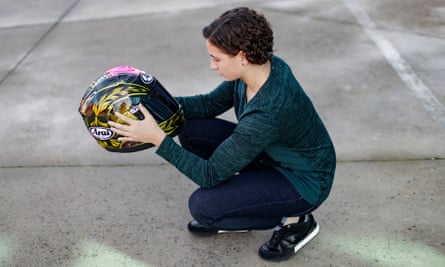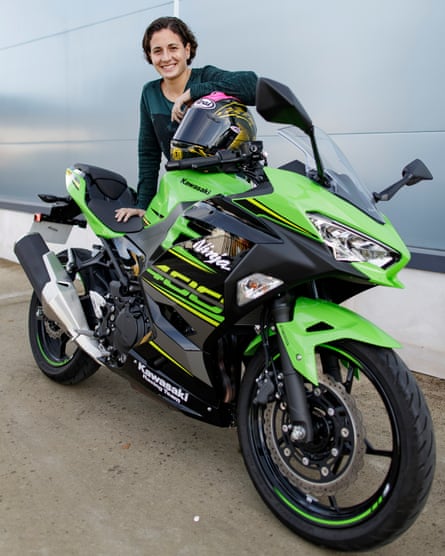“The most important thing for me is to win like a great rider. That was my goal, my dream,” says Ana Carrasco, the first woman to become a world champion motorbike rider. She won the World Supersport 300 title in dramatic style in September when, having led the championship for much of the season, her history-making feat was only confirmed on the last lap of the final race at Magny-Cours in France.
“I am also a woman,” Carrasco says pointedly on a quiet afternoon in Getafe, on the outskirts of Madrid, when she is asked about the wider impact of becoming world champion. “So it is important to show everyone that a woman can be just as good as a man. It’s also important there can be more women riding in the world championship in a few years. This was a big moment for me – and for women in the sport.”
The 21-year-old, who comes from Murcia in southern Spain, is softly-spoken and intelligent. It is easy to imagine her one day becoming the lawyer she plans to be, with Carrasco currently in the second year of her part-time law degree, as she discusses her hard road as a female rider.
Carrasco has ridden professionally since she was 16, even though she only had her expenses paid rather than receiving a wage for the first three years. In her understated way she points out that male riders also struggle at the outset of their careers. But they do not suffer the isolation Carrasco experienced when she joined the Moto3 world championship, two tiers below MotoGP, in 2013.
“The first year was really difficult,” she remembers. “The riders were not ready to have a woman on the grid. They didn’t want to help me so it was very hard. But by the middle of the season I won my first points and they could start to see I was fast.”
Did any of the men say anything demeaning to her? “No, never,” Carrasco says. “You could just tell what they thought. They didn’t want to look at me and I had to do everything alone. I had to find the line on my own. New tracks, new bike and it was so hard. Normally a young rider will find an older rider who will let him follow so he can learn the line. I had to learn how to be fast alone.”

Carrasco found ways of subverting the status quo. In 2014, in Assen, rather than being shielded from the sun by an umbrella held by a smiling grid girl before the race, she was accompanied by a young man whose muscled torso was bare. Carrasco sat next to him with her helmet on and visor up, impassive and ready to race.
“My team was from Holland and they wanted to say something different,” she explains. “I was happy. I said: ‘They have grid girls – why can’t I have a grid guy?’ So for one race it happened and we showed people women don’t just have to be grid girls. They can race too.”
In Carrasco’s debut season, aged 16, she had become the first woman to score points in a professional motorbike race in 12 years. But that breakthrough faded. “After the first year we didn’t have any sponsors. I missed the last four races in the second year [2014] because the team could not continue. Then in 2015 I ride again with another team but it was not competitive. That moment was the most difficult – but I always believed if someone gave me the opportunity I could win.”
Life was financially challenging. “I was racing for free,” Carrasco says. “They paid all my expenses, my travel, but I didn’t get any pay.”
In 2017 she made a bold decision to switch to the new Supersport 300 World Championship. She immediately looked at home on a Kawasaki Ninja 300 – and began to be paid. “I am now riding near the top so it’s possible to have good rewards. Supersport 300 was a good opportunity but it is very competitive and actually a more difficult category than Moto 3. You have to race almost perfect because if you make a mistake you end up at the back.”
In September 2017, Carrasco’s career changed forever when she made her first slice of sporting history. She became the first woman to win a world championship motorcycle race when, with exquisite timing, she slipstreamed the two leading riders in the championship and overtook them with seconds left in Portugal. It was brilliant racing as she found a draft on the final stretch to zip past Alfonso Coppola and Marc García.
“We were fighting so much to win and I took the lead 20 metres before the end. It was one of the most important days of my life because it changed my career. I showed many people I am good enough to win. After this I had more opportunities – and went to a better team [Kawasaki Ninja 400].”
Before then was she doubted because she is a woman? “For sure. There are problems being a woman in this sport. My problem was that people did not believe I could win. I said many times I was good enough but it’s difficult for some to believe it. After Portugal many people accepted it.”
Carrasco began this season with the world championship as her objective. That ambition became realistic when she followed an imperious victory by 11 seconds at Imola with another win in the next race at Donington. “Imola was perfect. I was on pole [becoming the first woman to win pole position in a world championship race], I won and got a good lead in the championship. At Donington we were 25th in the rain in the first practice but then we got pole and the victory was very important. But after this the rules changed and it was difficult.”
Carrasco was 22 points clear but a change in the regulations affected her bike and she struggled. “We had to put 40 kilos on the bike. So at the start of the championship I had a very good bike but after the change I had a bike that would make the top 15 – nothing more. In the last four races we didn’t have a good set-up.”
Her lead had shrunk to 10 points before the final race. “I was 25th in qualifying so my mechanics worked hard the night before and we found the problem in the front suspension. Magny-Cours is a track where you have only two or three places to overtake. But my pit board was telling me what position I needed. I knew if Scott Deroue [her Dutch teammate] won I had to be on the podium. From 25th to third is very hard.”

Deroue was leading until he retired on the sixth lap. Carrasco’s only rival for the title then was Mika Pérez. “The board told me if Mika won I had to finish 10th.”
Carrasco had climbed to 13th but with Pérez leading on the last lap it looked as if he would become world champion. But Supersport 300 is intensely competitive and Dani Valle’s Yamaha sped past Pérez on the inside. Valle held his line through the final chicane and Pérez finished second with Carrasco 13th. She had become world champion by a single point.
“After the race I was just waiting for someone to tell me if I had won. I saw all the photographers at turn five and I knew one of them. I said: ‘Did I win?’ He said: ‘Yeah, yeah, stop here!’ That was the moment I knew. I was crying for sure, with big emotion.” Did it live up to her dream of becoming world champion? “Yeah, and more,” Carrasco says with a smile. “It was way more than I expected. After this my life changed.”
What a final lap!!!!! 🏆 @AnaCarrasco_22 becomes the 1st woman to win a motorcyle racing World Championship #UnstoppableAna #PinkWarrior#WorldSSP300 #FrenchWorldSBK pic.twitter.com/gylvEsFH5L
— WorldSBK (@WorldSBK) September 30, 2018
Carrasco has been praised by Marc Márquez and Jonathan Rea who this season again became, respectively, MotoGP and Superbike world champions. “I know Marc from Moto3. I have a good relationship with him and with Rea now. Rea helped me and told me some things to help me win the championship. It is important the best riders think I have talent.”
Is her deepest ambition to compete in MotoGP? “Yeah, but for the moment I prefer Superbikes. We have to be calm thinking about the future. I am very young so next season I want to stay here and be at the top again. Maybe in five years I could be in [World] Superbikes or MotoGP.”
Will the physical demands of MotoGP be her hardest challenge? “The bike is more powerful in MotoGP and I will need to work on my physique. It’s the same if I go to 600cc. But with a trainer you can prepare yourself to be stronger. The young Márquez that rode a 125 is not the same Márquez now. You have to prepare for MotoGP.”
Carrasco dedicated her world title to a young Spaniard who will never fulfil his potential. Luis Salom, the 24-year-old Moto2 rider, died during practice for the Catalunya Grand Prix in 2016. “We were good friends since 2013 when I started in Moto3. So when he died I made this promise to myself. If I ever win the world championship I will dedicate it to him because he fight too much to be a rider. His mother called me the day I won and I will see her in Majorca at Christmas. She is happy we remember Luis.”
Carrasco believes the days of silent discrimination are over. Even a breakthrough into MotoGP will surely not be blocked just because she is a woman. “I will have the opportunity now,” Carrasco stresses.
She smiles when asked if she can sense a changed attitude on the grid. “After winning the title I think they have even more respect for me – not because I’m a woman but because everyone respects the world champion.”

Comments (…)
Sign in or create your Guardian account to join the discussion